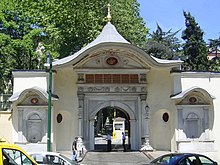High gate
" High Gate " (originally Ottoman پاشا قاپوسى İA Paşa ḳapusı , later Ottoman باب عالی İA Bâbıâli , rarely tooباب اصفی / Bāb-ı Āṣefī ) was originally the general name of the entrance gate to cities (→ city gate ) and royal palaces in the Arabic-speaking area . Later it was referred in particular to the Sultan's Palace in Istanbul and became a metonym for the seat of the Ottoman government.
The name comes from the fact that the reception ceremonies for foreign ambassadors and envoys were held at the gates of cities or rulers' palaces according to old oriental custom. The guard at the Sublime Gate was provided in the Ottoman Empire by the Kapıkulu , a special infantry unit of the Ottoman Army .
From 1718 to 1922 the term was used to designate the seat of the Ottoman Grand Vizier or the Ottoman government ( Dīwān ). During long periods of the empire real political power emanated from here, and not from the court of the Sultan ( Yıldız Köşkü ). It was said of foreign ambassadors in Constantinople that they were “accredited at the Sublime Porte ”.
See also
literature
- Gate, high one . In: Meyers Großes Konversations-Lexikon . 6th edition. Volume 15, Bibliographisches Institut, Leipzig / Vienna 1908, p. 750 .

